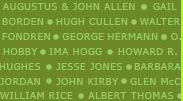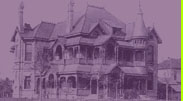OUR LEGACY - The Civil War
 Recovery from plague, flood and fires came none to soon. What proved to be a more formidable setback, the War between the States, now threatened Houston's progress. Although slavery had become a hotly debated national issue, it was only a secondary issue in Houston, where the question of succession was the major topic of debate. In 1859, Sam Houston left his United States senate seat to become Texas' governor. Despite his opposition, the convention held on January 28, 1861, voted by a majority of 165 to 7 to withdraw from the Union. On March 16th, Sam Houston was ousted from office when he refused to take the oath of allegiance to the Confederacy.
Recovery from plague, flood and fires came none to soon. What proved to be a more formidable setback, the War between the States, now threatened Houston's progress. Although slavery had become a hotly debated national issue, it was only a secondary issue in Houston, where the question of succession was the major topic of debate. In 1859, Sam Houston left his United States senate seat to become Texas' governor. Despite his opposition, the convention held on January 28, 1861, voted by a majority of 165 to 7 to withdraw from the Union. On March 16th, Sam Houston was ousted from office when he refused to take the oath of allegiance to the Confederacy.
During the war, many of the city's young men joined the Confederate forces. Most served in local units such as the Confederate Guards, the Bayou City Guards, Turner's Rifles and Terry's Texas Rangers. Houston served as the military headquarters for the Confederate district of Texas, New Mexico and Arizona. When Federal troops occupied Galveston on October 4, 1862, Houston was inundated with refugees, many of whom chose to remain there after the war.
This was not the war's only repercussion for Houston. Union forces blockaded the entire Texas coast from the start of the hostilities. Some 1,600 Confederate forces under General John Bankhead Magruder were mobilized in Houston and recaptured Galveston Island on January 1, 1863. Although they held it until the end of the way, in 1865 , and kept the port open, the vital shipping trade slowed to a trickle until it came to a standstill. Cut off from supplies and its port idle, most Houston residents and businesses suffered. Such goods as cotton were transported by rail and wagon to Mexican ports.
Throughout this period of hardship, Houstonians displayed their mettle in various ways. On September 8, 1863, Lieutenant Dick "the Kid" Dowling led a company of 42 men against a 15,000-man Union landing force at Sabine Pass. Capturing two of the four federal gunboats and a number of prisoners, in what proved to be the last major Union offensive in Texas, Dowling and his men prevented the Yankees from taking this strategic rail junction.






